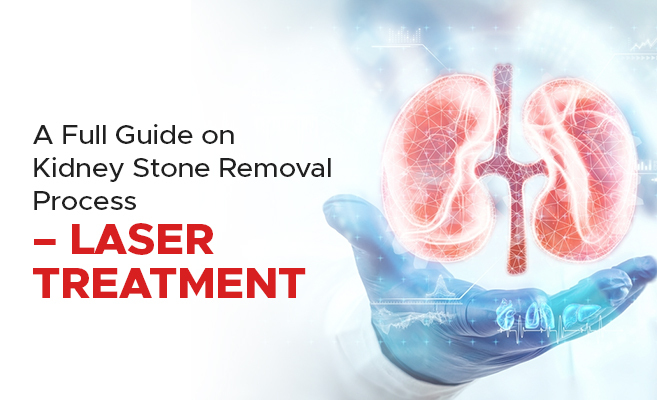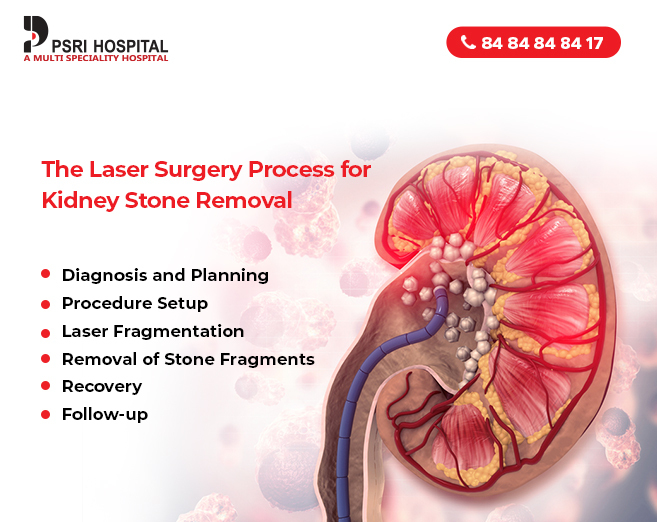A Full Guide on Kidney Stone Removal Process – Laser treatment

Kidney stones are a common health concern that can significantly impact your quality of life. These hard deposits form in your kidneys and can cause severe pain, urinary issues, and even lead to more serious kidney problems if not addressed. Removing kidney stones not only alleviates pain but also prevents further complications. In this guide, we will explore the effective solution of laser surgery for kidney stone in India, ensuring you can make an informed decision about your health care.
What Are Kidney Stones?
Kidney stones are solid masses made of crystals. They originate in your kidneys but can develop anywhere along your urinary tract, which includes the kidneys, ureters, bladder, and urethra. There are several types of kidney stones, which include calcium stones, uric acid stones, struvite stones, and cystine stones, each with their own causes and effects.
Symptoms Indicating You Might Have Kidney Stones
The symptoms of kidney stones are not subtle and can significantly disrupt your daily life. Common indicators include:
- Intense pain on one side of your back or below your ribs. This pain often moves to the lower abdomen and groin area as the stone travels.
- Pain that fluctuates in intensity or comes in waves.
- Painful urination, which could feel sharp or burning.
- Changes in urine color, such as pink, red, or brown urine, or cloudy urine with a foul smell.
- Frequent urination, urgent need to go, or going in small amounts.
- Nausea and vomiting, which are your body’s ways of reacting to intense pain.
- Fever and chills, indicating an infection might be present.
These symptoms demand immediate medical attention to confirm the presence of kidney stones and to plan effective treatment for the removal of kidney stone.

The Laser Surgery Process for Kidney Stone Removal
Laser surgery, specifically Laser Lithotripsy, is a modern method to safely and effectively remove kidney stones. Here is the process of removal of kidney stone:
Diagnosis and Planning: First, your doctor will confirm the presence of kidney stones using imaging tests like a CT scan, which shows detailed images of your kidneys and urinary tract. This step is crucial for planning the surgery by determining the stone’s size and position.
Procedure Setup: On the day of the surgery, you will receive anesthesia, which means you will be asleep and will not feel pain during the procedure. The doctor then inserts a thin, flexible scope through your urinary tract to reach the stone.
Laser Fragmentation: Once the scope reaches the stone, a laser fiber is used to emit precise laser pulses to break the stone into very small pieces. This laser is very effective and does not damage surrounding tissues.
Removal of Stone Fragments: The fragmented stone pieces are either small enough to be passed out with urine on their own, or they are removed by the surgeon using special tools through the scope.
Recovery: The kidney stone operation usually lasts between 30 minutes to an hour, depending on the stone’s size and location. Most patients can go home the same day, although some might need to stay overnight for monitoring. You might feel slight discomfort or pain after waking up, but this is typically manageable with medications.
Follow-up: After the procedure, drinking lots of water helps flush out the stone fragments more quickly. Your doctor will also schedule a follow-up visit to ensure all fragments are cleared and to discuss ways to prevent future stones.
This laser treatment is highly effective with minimal risk, offering a quick recovery and a high rate of success in removing kidney stones.
Aftercare and Recovery
Recovering from laser surgery for kidney stone removal typically involves straightforward steps to ensure comfort and health:
Hydration: One of the most crucial steps post-surgery is to drink lots of water. This helps flush the urinary system and aids in passing any remaining stone fragments more easily.
Pain Management: Some pain or discomfort after the procedure is normal. Your doctor will prescribe pain relievers to manage this. It is important to follow the dosage instructions to stay comfortable.
Monitoring: Keep an eye on your urine. It is normal to see a small amount of blood, but this should clear up within a few days. If it does not, or if you experience intense pain, fever, or chills, contact your doctor.
Rest: Allow your body to rest for a few days post-surgery. Avoid heavy lifting and strenuous activities until your doctor permits you.
Diet: Depending on the type of stones you had, your doctor might recommend specific dietary changes to prevent their recurrence.
Limit Oxalate-Rich Foods: If you are prone to forming calcium oxalate stones, you might need to limit foods rich in oxalates, such as spinach, beets, and almonds.
Calcium Intake: Contrary to popular belief, a normal intake of calcium can actually help prevent certain types of stones, such as calcium oxalate stones. However, it’s best to get your calcium from food rather than supplements, which have been linked to stone formation in some people.
Maintain a Healthy Weight: Being overweight may increase the risk of kidney stones. Adopt a balanced diet and regular exercise routine to manage your weight effectively.
Regular Check-Ups: Regular visits to your doctor for urine and blood tests can monitor your kidney health and detect any new stone formations early.
Trust PSRI Hospital for Comprehensive and Compassionate Care
When you are facing the discomfort and complications of kidney stones, you need a solution that is both effective and minimally invasive. PSRI Hospital is renowned as the best hospital for kidney stone treatment in India. Laser surgery for kidney stone removal at PSRI Hospital offers a high-success-rate treatment with the support of top medical professionals. Trust us to help you return to a healthy, active life. Contact PSRI Hospital today to schedule a consultation and take the first step towards a life free from kidney stone pain.
FAQs
How long does it take to recover from laser surgery for kidney stone removal?
Ans. Recovery time can vary, but most patients can resume normal activities within a few days post-surgery. Complete recovery, including the passing of stone fragments, typically occurs within a week.
Is laser surgery for kidney stones painful?
Ans. The procedure itself is pain-free due to anesthesia. Post-surgery, some discomfort or mild pain is normal but is typically manageable with prescribed pain medication.
What are the chances of kidney stones recurring after laser treatment?
Ans. While laser treatment effectively removes stones, recurrence depends on many factors, including diet, fluid intake, and genetic predisposition. Following preventive measures can significantly reduce the risk.
Can I eat normally after laser kidney stone surgery?
Ans. Yes, you can usually return to a normal diet soon after the surgery. However, your doctor may recommend specific dietary changes if your stone analysis suggests they could prevent future stones.

 Book An Appointment
Book An Appointment Virtual Consultation
Virtual Consultation





